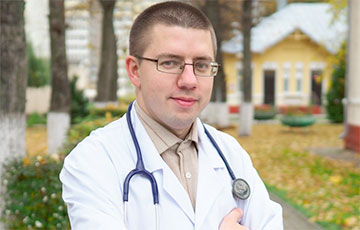Belarusian Doctor Mikita Salavei Shares Details Of Omicron Wave
10- 2.02.2022, 19:10
- 26,636

PHOTO: ONLINER.BY
Read on peculiarities, risk groups, and booster vaccinations.
Active spread of SARS-CoV-2 Omicron continues in Belarus. Infectious disease doctor and candidate of medical sciences Mikita Salavei spoke on his Facebook page about the main distinguishing features of this strain of the coronavirus.
Easily spread
The Omicron spreads very easily, causing an avalanche-like increase in the incidence, including among children. According to various estimates, one infected with the Omicron can infect 8-15 people, so it is important to continue to comply with preventive measures as much as possible (first of all, use masks in public places, wash frequently, treat hands with antiseptics, limit personal contacts, etc). Now any acute respiratory disease is almost 100% COVID-19; the circulation of other pathogens, including influenza, is again practically not recorded.
Booster vaccine reduces chance of developing symptoms
The Omicron easily breaks through the mechanisms of immune defense in those who have previously been ill with other variants of coronavirus or vaccinated only twice. At the same time, the booster dose significantly reduces the likelihood of developing symptoms of the disease, and especially the likelihood of hospitalization and severe course in risk groups (according to some research estimates, by 20-24 times). Therefore, it makes sense to undergo a booster revaccination, especially for people at risk. Adenovirus vaccines are definitely the choice (Sputnik Light for revaccination, for example), the Sinopharm / Vero Cell vaccine in this situation will be suboptimal, inferior in effectiveness to mRNA and adenovirus vaccines.
The disease course is milder than with the Delta strain
The disease caused by the Omicron in most patients is relatively mild. This is not comparable to what happened during the circulation of the Delta version of the coronavirus. However, the risk groups remained the same: overweight people with a body mass index of 30 or more, the elderly, people with chronic diseases, especially diabetes mellitus, metabolic syndrome and immunosuppression. In some of these patients, there will be a need for hospitalization and intensive treatment even with COVID-19 caused by the Omicron. Therefore, we continue to monitor “problematic” patients, carefully monitor the condition of our sick relatives if they have at least one risk factor for a severe and complicated course of COVID-19.
Common symptoms that mimic an intestinal infection
Symptoms mimicking an intestinal infection are often recorded, especially in young people. In the practice of the Infectious Diseases Hospital of Minsk, on some days up to 2/3 of patients coming to medical institutions with suspected salmonellosis or rotavirus infection are actually diagnosed of COVID-19. Especially characteristic is the appearance of nausea, repeated vomiting, watery diarrhea without fever and any symptoms of respiratory tract damage. Or vice versa, a combination of symptoms of damage to the gastrointestinal tract with respiratory symptoms (cough, runny nose or nasal congestion, severe sore throat without damage to the tonsils, conjunctivitis, and so on). In any case, when acute symptoms of an intestinal disorder appear, testing for COVID-19 is optimal today. In this case, it is necessary to use only the determination of the antigen or PCR of respiratory swabs. An attempt to determine antibodies to coronavirus in the blood in the early days of the disease is useless. They will appear no earlier than 10-14 days or may be determined due to a previous illness or vaccination, and not be associated with the current state of the person.
If intestinal symptoms have developed, it is easy to cope with the disease on your own. The key points are diet, fluid replacement with non-carbonated mineral water in small portions or with the help of special rehydration solutions, probiotics (reduce the duration of any problems with the gastrointestinal tract associated with viruses and bacteria, proven by numerous studies), and antiemetics. The treatment is similar to the treatment of any other intestinal infection.









